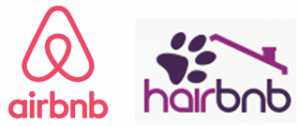‘Airbnb for dogs’ suffers bite of trademark law

Dog-sitting service Hairbnb may be forced to change its name after receiving a cease and desist letter from online rental marketplace Airbnb. An effective trademark watching strategy could have saved both businesses a headache, as Theo Visser explains.
Scottish business Hairbnb was set up by former RAF police dog handler Allan Ritchie to offer dog-sitting services, dog training and daycare for pets. In February 2018, Ritchie applied to trademark the name ‘Hairbnb’ in Class 43 (pet boarding and kennels) at the UKIPO, with the mark (pictured below) approved for registration in May the same year. Airbnb did not object to the application during the opposition period, and Ritchie subsequently invested ‘a large chunk of his savings’ in launching his brand and website.

That investment is now threatened after Airbnb sent Ritchie a cease and desist notice in April this year, demanding that he stop using the Hairbnb brand name on the grounds that it infringed the online rental marketplace’s trademark rights.
Bad press
As the owner of a valuable trademark, Airbnb is right to take action, even if it is against a sole trader. There is a chance that the public will confuse both companies and believe that there is a relationship between them. However, the American company would have avoided considerable bad press and expense had it opposed the application during the designated opposition period. Here, trademark watching plays a crucial role.
By the same token, it is important for any new business to investigate the availability of a chosen brand before investing time, resources and money to create and launch that brand. For that reason, trademark searching is an important step in any trademark registration or brand launch strategy. As is consulting an IP attorney if you are considering a brand name that is arguably inspired or is a pun on an existing well-known brand name, such as Airbnb. For additional advice on choosing a brand name for your business, or products or services, please read our article 'Trademarks: More than a description'.
AirBnb has since indicated that it may be willing to settle the dispute amicably.
Theo Visser is an IP consultant in the Amsterdam offices of Novagraaf.